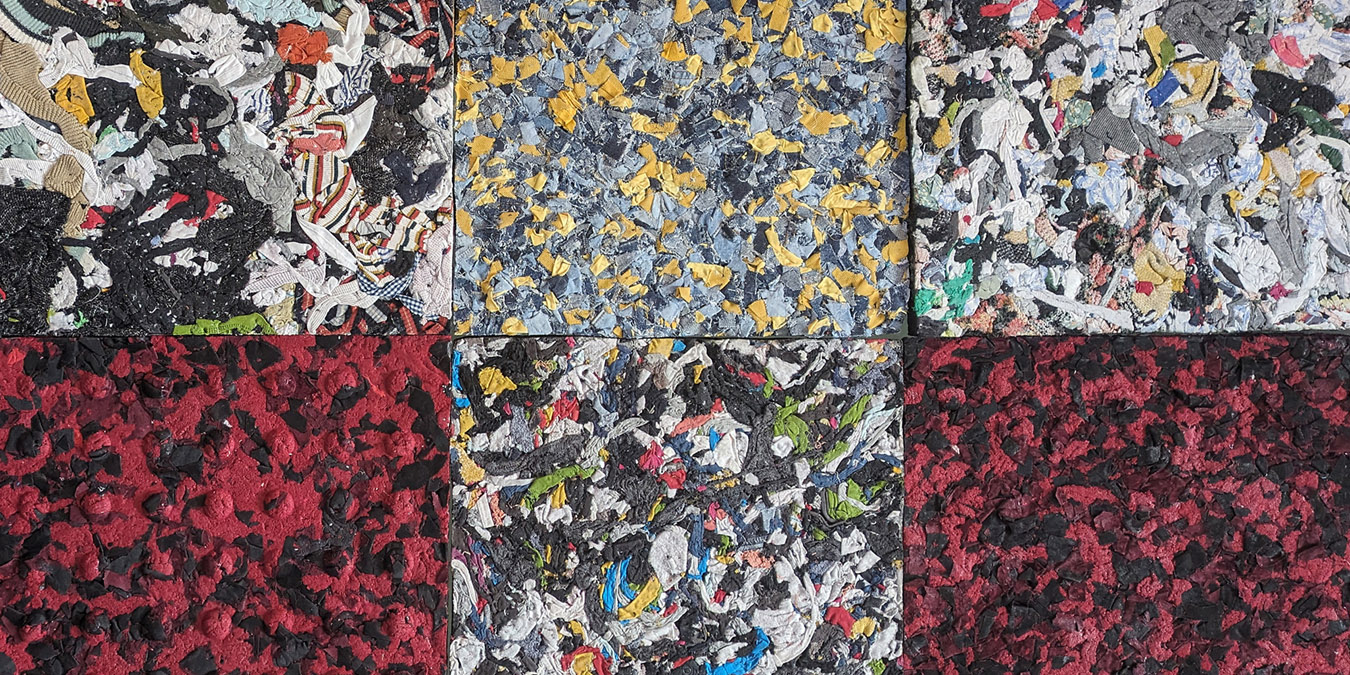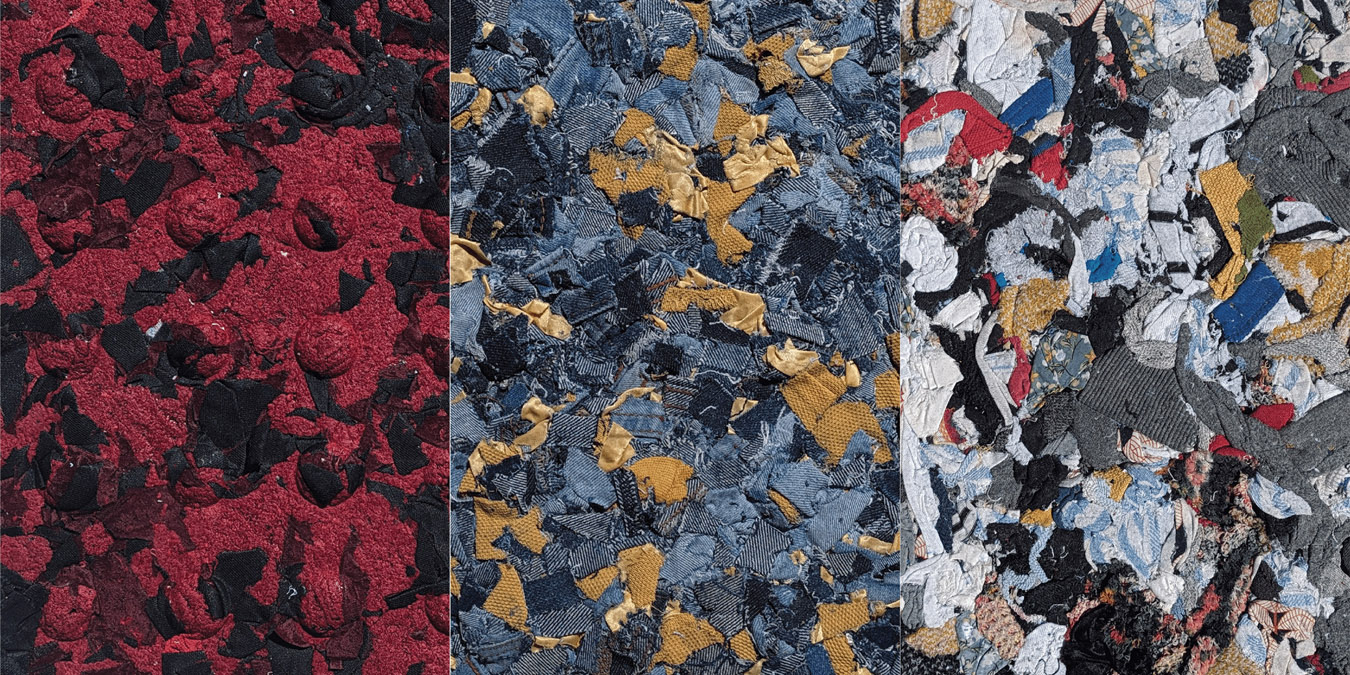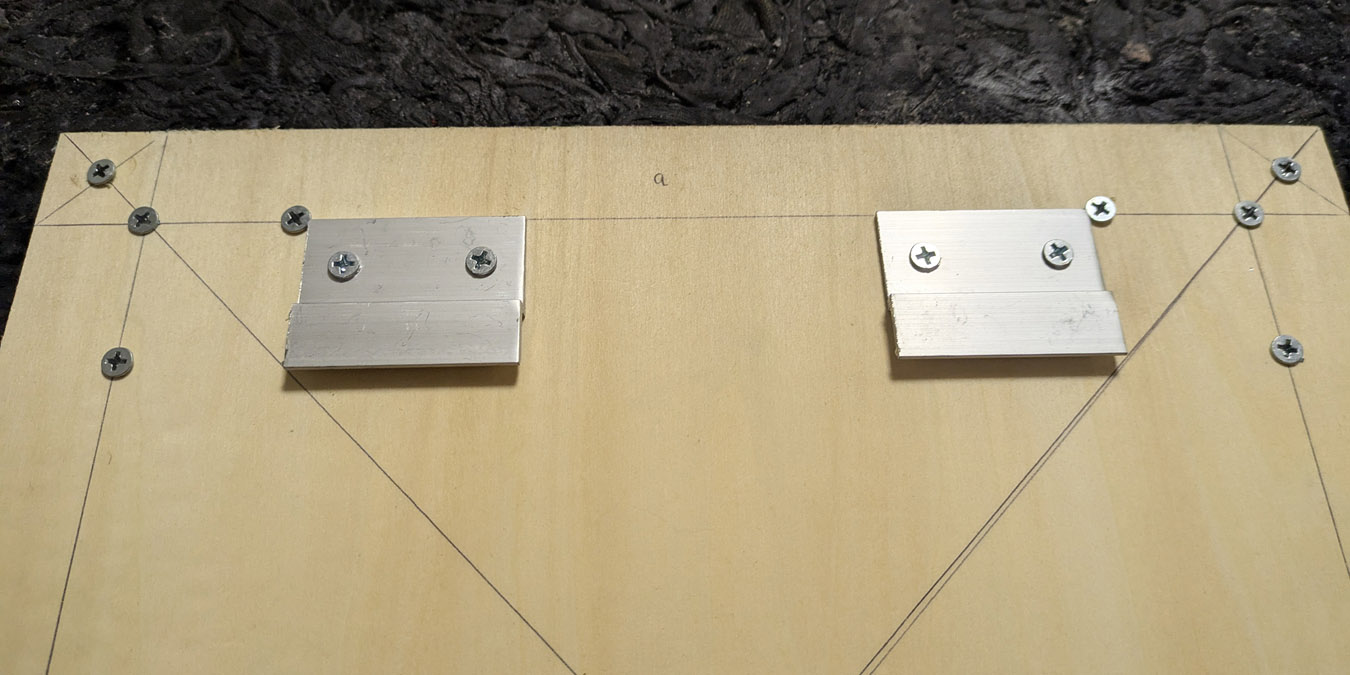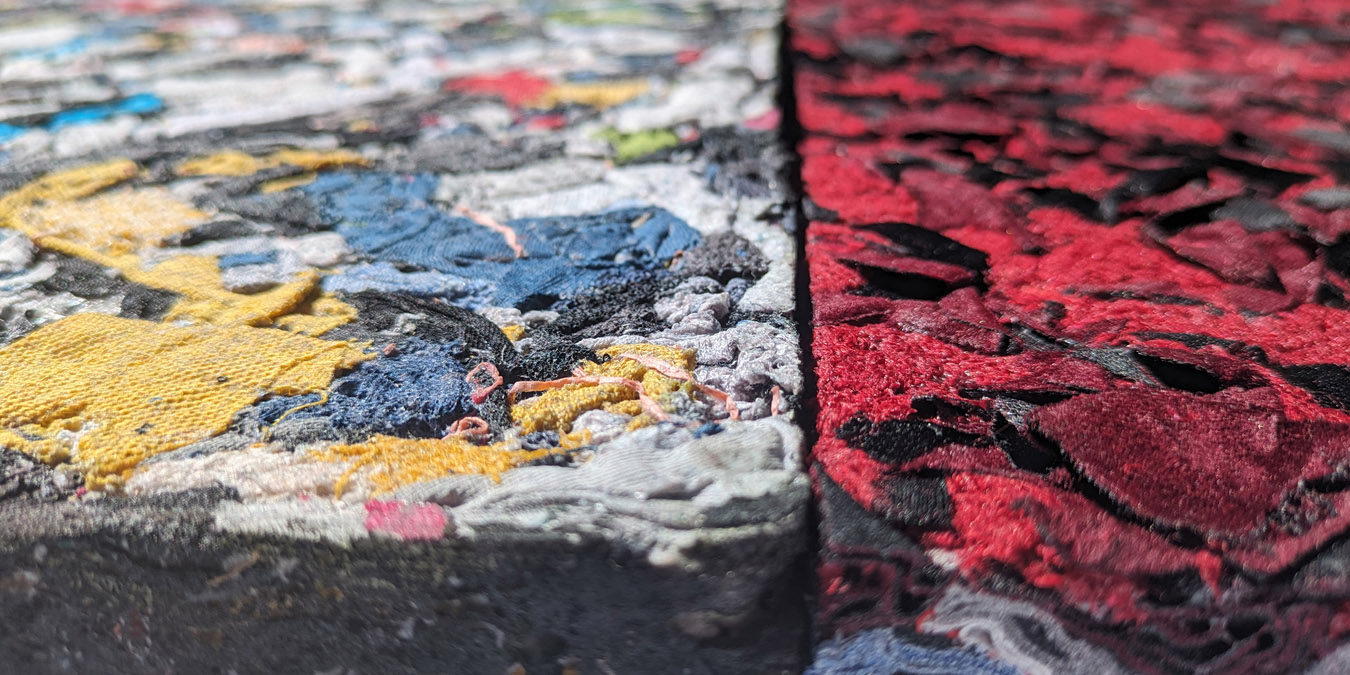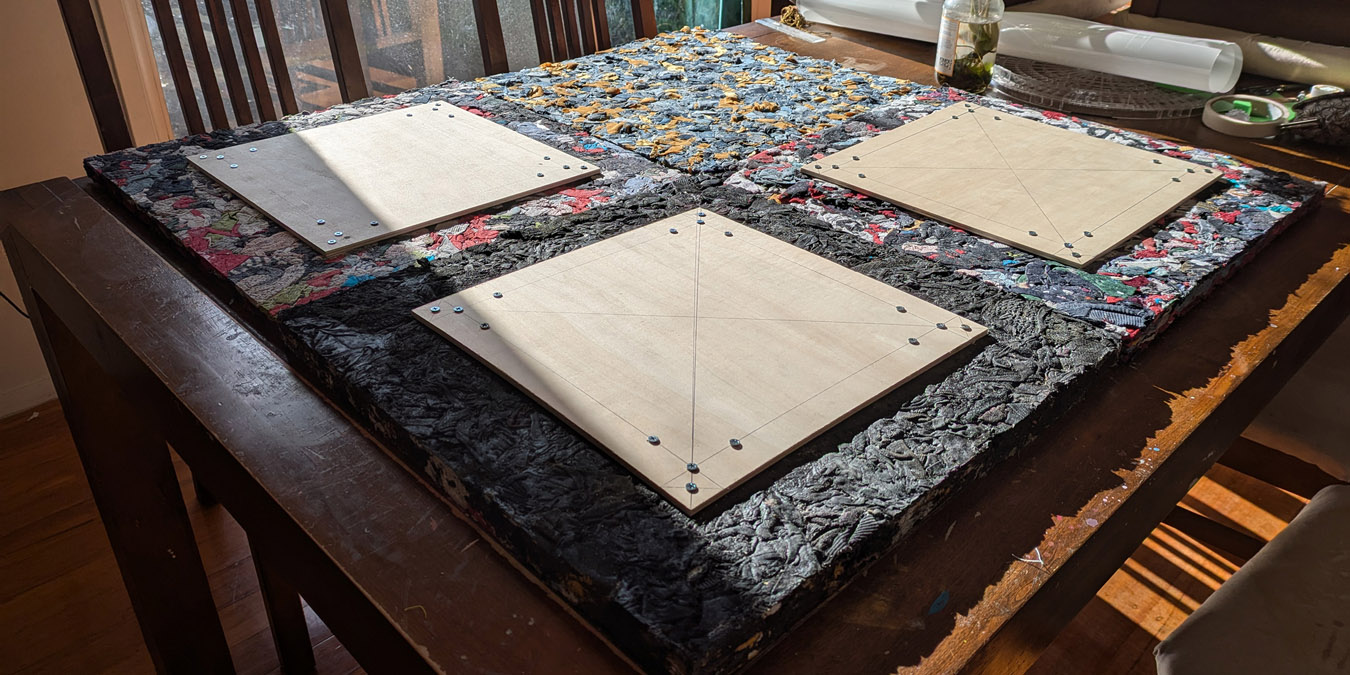In material tests, the starch-based glue demonstrated density that is equal to PVA with a lower curing/drying time. A humidity test was performed on a Sorbet’s acoustic sample over 5 days. A key observation was that the sample was soft after being sprayed with water but regained it’s toughness overnight. This is attributed to the high salt content of the starch-based glue that was used to bind the textile-waste based material. The aesthetic options of the acoustic panels were considered to reduce discrimination of selected textiles, to fully make use of suitable and available textile waste. Two aesthetic options of the acoustic panel: ”Blueberry Lemonade” and ”Red Velvet” feature selected colours and textures, whereas the ”Hundreds and Thousands” panel can be made from a wider range of textile waste. According to an acoustic performance test in a sound controlled environment, it was found that a 24mm textile waste based material outperforms an equally thick EchoPanel by 10.5% and acoustic foam by 23.9%. The design of the sound measurement apparatus for the acoustic performance test was appropriate from a professional source: Echo Engineering and utilizes 3 distinct frequencies of a sine wave (138.6hz, 554.5hz, and 2217hz) to measure the acoustic performance of material samples. The materials and processes required to construct the Sorbet acoustic panels are not toxic, therefore it can be ethically produced. The materiality of the acoustic panels also allows it to be easily recycled and reused by exposure to heat and water.
Sorbet
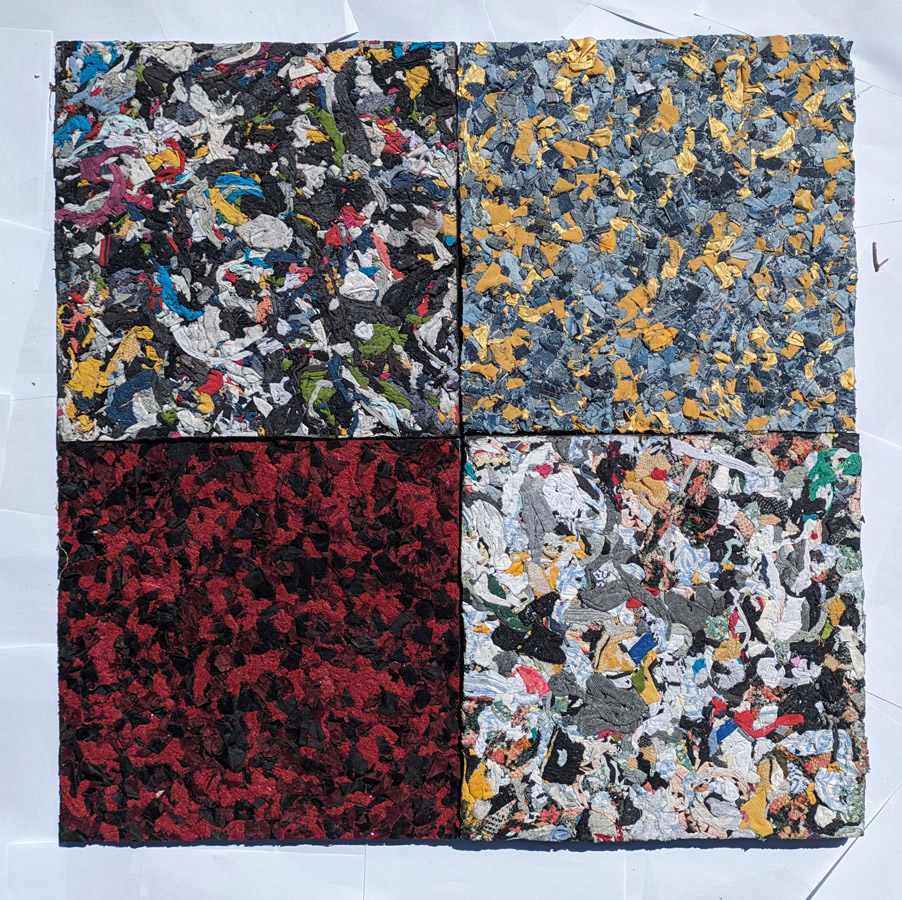
Sorbet are made from household’s textile waste and are available in Red Velvet, Blueberry Lemonade, and Hundreds and Thousands.
Sorbet acoustic panels were developed through the industrial design student’s honours project, that feature extensive materials research with waste materials and binders. The design outcome: Sorbet acoustic panels are made from 100% laundered and upcycled household textile waste, binded together with a starch-based glue. Sorbet acoustic panels are available in a range of colours. They are Red Velvet, Blueberry Lemonade, and Hundreds and Thousands.
Design Brief:
Sorbet acoustic panels are designed in response to the accumulation of household textile wastes, by using households’ textile waste and a starch-based glue to create a high performing acoustic material that is durable and easily recycled in the absence of permanent binders. Household textile wastes are used as they have the second lowest recovery rate after plastics. The starch-based glue is made from tapioca starch, vinegar, salt and water and demonstrates durability that is equal to PVA under non-humid environments. Furthermore, as the starch based glue is dehydrated with the textile material, it becomes porous which contributes to the material’s noise absorbency. According to an acoustic performance test in a sound controlled environment, it was found that a 24mm textile waste based material outperforms an equally thick EchoPanel by 10.5% and acoustic foam by 23.9%.
This project was developed by:
- Sze Tjin Yek
Design Process
Design Excellence
Simple and functional materials are the core of Sorbet acoustic panels. The Sorbet acoustic panels is made from textile waste and bonded with a starch based glue. Through an acoustic performance test in a sound controlled environment, Sorbet acoustic panels also demonstrate improved acoustic performance when compared to EchoPanels and acoustic foam. This is attributed to the higher porosity of the dehydrated starch glue that binds the textile material when compared to other binders such as waxes or PVA. The materiality of the acoustic wall panel provides affordances that promote the ease of recycling and reuse of product in its end of life. The recoverability of the product is attributed to its water soluble, starch-based glue. The material cost to produce each 450x450x(15-30) mm panel is $5.09 which includes the starch glue ($1.09), textile waste, and textile shredding service ($4.00). The aesthetic options of the acoustic panels were considered to reduce discrimination of selected textiles, to fully make use of suitable and available textile waste. Two aesthetic options of the acoustic panel: ”Blueberry Lemonade” and ”Red Velvet” feature selected colours and textures, whereas the ”Hundreds and Thousands” panel can be made from a wider range of textile waste. Sorbet Acoustic Panels are designed to model sustainable practice through its materiality: a combination of textile wastes and a starch-based binder that demonstrates durability, quality, with an ethical manufacturing process.
Design Innovation
The key features of Sorbet acoustic panels are its acoustic performance, its aesthetic language that reimagines textile-waste as a desirable source of material, and its mission to combat household textile waste. Sorbet acoustic panels are available in three aesthetic options to fully make use of the colours of household textile-waste. They are Blueberry Lemonade, Red Velvet, and Hundreds and Thousands. Sorbet acoustic panels are more sustainable than common acoustic panels which are made from open cell polyurethane foam and are difficult to recycle. Sorbet outperforms contemporary acoustic panels manufacturers such as EchoPanels and Mogu Mogu as close to 100% of the materials are sourced from household textile-waste, and 100% of the textile-waste based material can be energy efficiently retrieved, and uncontaminated for reuse. EchoPanels are made from 60% recycled PET whilst Mogu Mogu acoustic panels are made from textile fibers bonded together with mycelium.
Design Impact
Acoustic panels are integral within both domestic and commercial spaces, and protects both the mental and physical health of users from noise pollution. Effective noise control can improve the performance of workers especially in environments exposed to high noise pollution levels. A Sorbet acoustic panel is (18-28) x 450 x 450mm each. The textile based substrate demonstrated a density that is equal to PVA when dried/cured. An acoustic performance test was performed in a sound controlled environment, and found a 24mm textile waste based material outperforms an equally thick EchoPanel by 10.5% and acoustic foam by 23.9%.
Circular and Sustainability Criteria
The increase of household textile wastes that ends up in landfill are attributed to the accessibility of fast fashion especially among its’ growing younger consumers. Companies such as Temu, Shein and the Iconic exploits the demand for fast fashion with cheap and low quality clothing items that pollutes Australia’s landfills. The ephemerality of fast fashion is detrimental to the sustainable culture that is nurtured within Australia where the lifespan of clothing items are prioritised. Sorbet acoustic panels aligns with Australia’s growing culture for sustainability through its durable and easily recyclable material that encourages reuse.
Meet the Jury
Entries are judged by a panel of national and international design experts representing the diverse range of design disciplines showcased by the awards.
View the Awards JuryEntering the Awards
The Awards are free to enter for eligible Victorian designers and architects with submissions across eight design categories.
Learn more about the guidelines and processType on the line above then press the Enter/Return key to submit a new search query

